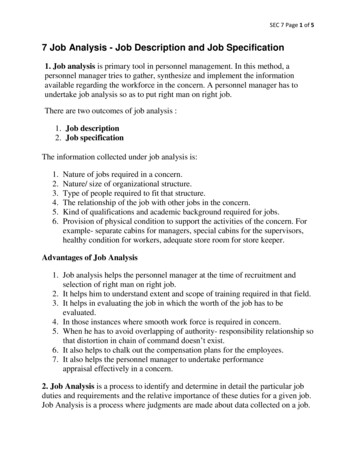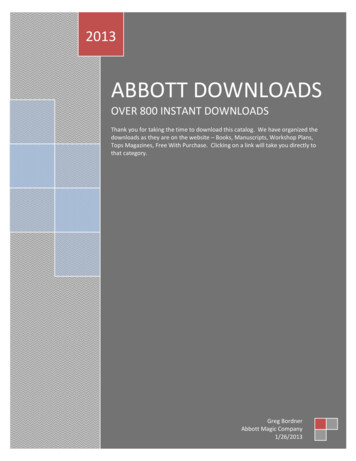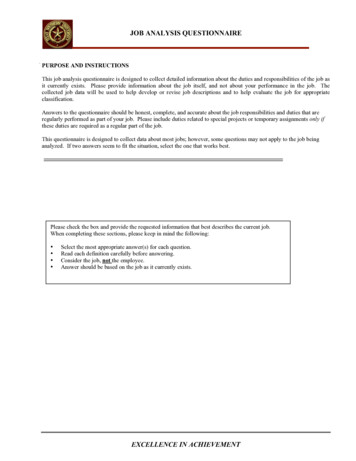
Transcription
THE BOOK OF JOB
STUDIES IN BIBLICAL THEOLOGYA series of monographs designed to provide clergy and laymen with the bestwork in biblical scholarship both in this country and abroadAdvisory E.ditors:C. F. D. MouLE, Lady Margaret's Professor of Divinity in the University of CambridgeProfessor of Semitic Lang11tJges and Uteratures,University of ManchesterPETER ACKROYD, Samuel Davidson Professor of Old Testament Stmlies,University of LondonFLOYD V, FILSON, Professor of New Testament Literature and Hirtory,McCormick Theological Seminary, ChicagoG. ERNEST WRIGHT, Professor of Old Testament History and Theologyat Ha111ard UniversityJAMES BARR,
STUDIES IN BIBLICAL THEOLOGYSecond Series ·11THE BOOK OF JOBIts Origin and PurposeNORMAN H. SNAITHSCM PRESS LTDBLOOMSBURY STREET LONDON
SBN33400791 7968I 968FIRST PUBLISHED I@SCM PRESS LTDPRINTED IN GREAT BRITAIN BYROBERT CUNNINGHAM AND SONS LTDALVA
CONTENTSviiPrefaceixAbbreviationsI The Folk-tale and the Original BookII The Origin of the Story of Job119III The First Book of Job: 1.r-2.10; 3; 29-31; 38-39;3440.1-42.6; 42.10-16IV The First Cycle of Speeches: Chapters 3-13V TheSecondCycleofSpeeches: 14.1-21.21VI The So-called Third Cycle of Speeches: 21.z.z-27.23VII The Wisdom Poem: Chapter 28VIII The Speeches of Elihu: Chapters 32-37IX The Speeches of Elihu (continued)X505564728692The Aims of the AuthorAppendix I45Proposed Reconstructions of chapters24-27; 29-31100Appendix II The So-called Aramaisms in the Bookof Jobof NamesIndex of Biblical ReferencesIndex104r 13I 15V
PREFACETHIS book is developed from lectures delivered in the Universityof Oxford in 1963-4 when I was Speaker's Lecturer in BiblicalStudies. I am grateful for the opportunity which this appointmentafforded me of bringing into some sort of coherence thoughtsconcerning the Book of Job which have been gradually developedduring half a lifetime.The point of view here taken concerning the problem of theBook of Job is that substantially the whole book is the work ofone man. He is responsible for the present form of both prologueand epilogue. He is the author of the speeches of Job and thethree friends. He is responsible for the Elihu speeches and forboth Yahweh speeches. Further, I do not think that the authorwas primarily concerned with the problem of suffering, whethersuffering in general or the suffering of one particular individual.His main problem is the problem of the transcendent God. Hasthis God anything at all to do with this world of men and theiraffairs ? How can mortal man ever get into touch with this HighGod? How can the High God ever be imminently concerned withthe affairs of men?This problem of the High God is discussed against the background of the sufferings of Job. Here is the author's example ofthe incidence of the problem: human suffering in this world, andthe blatant injustice of so much of it. But it is not the basic problem of the book. The basic problem is the basic problem of religion the whole world over. Most of all it is the problem ofmonotheism. To use phraseology associated with the study ofprimitive religions: how can the High God fulfil the functions ofthe low gods, and still remain a High God? The answer of theBook of Job is submission: God still far away, unapproachableand incomprehensible, but with a working rule for men. Thisworking rule is: the fear of the Lord, and turning aside from evil(Job 2.8.2.8). This, as Charles Wesley wrote, is 'our business herebelow'. Orthodox Christianity has sought to solve the problemby saying both Yes and No. God is indeed a High God, but thevii
viiiPrefaceincarnation has brought God near to man (made him imminent)and the Holy Spirit can indeed indwell men (made him immanentin man).I have been anticipated in part in some of my conclusions concerning the authorship and constitution of the Book of Job byRobert Gordis of the Jewish Theological Seminary in New YorkCity. So far as the authenticity of the Elihu speeches is concerned,Rabbi Gordis's work is to be found in 'Elihu the Intruder',Biblical and Other Studies, ed. Alexander Altmann (1963), pp. 60-78.For Rabbi Gordis's attitude to the Book of Job as a whole, seehis The Book of God and Man; A Stutfy of Job (1965). My earlierviews have undergone little or no modification because of RabbiGordis's published works, but since I have read Rabbi Gordis'sbook, I have rewritten most of what I had already done. He and Ihave backgrounds that are wholly different and we have studiedthe Book of Job from widely different attitudes, but we agree in asubstantial number of details.The titles of works of commentators cited in the text can beobtained from the lists given by E. Dhorme (A Commentary on theBook of Job, ET, 1967, pp. v-vi), C. Cohen (Interpreter's Dictionaryof the Bible, II, 1962, pp. 924-5) and 0. Eissfeldt (The Old Testament,An Introduction, ET, 1956, p. 764).
ABBREVIATIONSANEY Ancient Near Eastern Texts relating to the Old Testamented. J.B. Pritchard, 2nd ed. 195 5AquilaAqAVAuthorized Version (King James Version)AVmAuthorized Version (margin)BDBA Hebrew and English Lexicon of the Old Testament, ed.Francis Brown, with the co-operation of S. R. Driveand C. A. Briggs, 1906CodicesAAlexandrinusBVaticanusEphraemi rescriptusCSinSinaiticusCRContemporary ReviewDOTT Documents from the Old Testament Times, ed. D. WintonThomas, 1958DVDouay-Rheims VersionEVVEnglish VersionsGKW. Gesenius, Hebrew Grammar, ed. and enl. E. Kautzsch2.nd English ed. 1910IBInterpreter's BibleICCInternational Critical CommentaryJerusalem BibleJBKerKerithoth (Mishnah)LXXSeptuagintMTMasoretic (Hebrew) TextNEBNew English BibleRSVRevised Standard VersionRVRevised VersionRVmRevised Version (margin)sSyriac (Peshifta) VersionSymSymmachusTTargumThTheodotion
AbbreviationsXUgaritABB.FrHKVVTVTSZAWAqhatBaalBaal (fragments)HadadKeretVulgateVetus TesfatJJenfulJJSupplement to Vetus TestamentumZeitschrift fiir die alttestamentliche Wissenschaft
ITHE FOLK-TALE AND THE ORIGINAL BOOK1.The Original BookTHE Book of Job is found in the third section of the HebrewBible, in the Kethubim, the Writings. Its actual position varies.According to the Talmud tradition (Baba bathra 14b), it comesthird and follows Ruth and Psalms. The main Sephardi (Spanish)tradition also makes it third, but following Chronicles and Psalms.It is third also in the Ashkenazi (mid-European) tradition, whereit follows Psalms and Proverbs. This is the order usually followedin printed editions of the Hebrew Bible, though not in the thirdedition of Kittel's Biblica Hebraica (text by Paul Kahle), where theorder of the Leningrad Codex B 19a is followed, with Job secondand Proverbs third. The consistent element throughout is thatJob is linked with the other two poetical books, so that Psalms,Job and Proverbs come together. Jerome's list of the books of theHagiographa (Writings) begins with Job (Prolog. Gal.), and hefollows this with 'David' and 'Solomon', that is, Psalms andProverbs, presumably because he is following the LXX traditionwhich fits the various books into what was believed to be theproper historical order, it being presumed that Job lived beforeDavid. 1The English versions have followed what, by the thirteenthcentury, had become the accepted order in the Vulgate, with theProtestant versions omitting the books of the Apocrypha, whilethe Roman Catholic versions retain them. Thus Job follows thehistorical books, and precedes Psalms and Proverbs. As we haveindicated, this is because Job was reckoned to have lived beforeDavid. The Syriac (Peshi{ta) version is much more radical. It re1 Further details and some variations from the normal patterns are to befound in H. E. Ryle, The Canon of the Old Testament, 2nd ed., 1895,pp. 210-38,28rf.; in H. B. Swete, An Introduction to the Old Testament in Greek, 1900,pp. 197-230; and in C. D. Ginsburg, Introduction to the Massoretico-criticaledition of the Hebrew Bible, reissued 1966, pp. 1-8.I
2.The Book of Jobgards Job as having lived in the patriarchal age, and therefore itplaces the book immediately after Deuteronomy. This actuallywas placing the book as early as possible, since no zeal for thehistorical order would induce any translator or editor, of theGreek, Latin or Syriac, to disturb the priority of or interfere withthe order of the first 'Five Books of Moses'. The Talmud (BabaBathra 14b) recognized this: 'If it be said, Job lived in the days ofMoses, Job therefore should be placed at the head.' The reasongiven against this procedure was, 'verily, we do not begin withcalamity', but doubtless the true reason was that nothing could bepermitted to disturb the priority of the Torah. 2The pattern and the story of the Book of Job are well known.The book consists of a prologue and an epilogue, both in prose,and within these a series of speeches, all in verse, except for theshort introduction to the speeches of Elihu (32.1-5). In theprologue Job appears as a wealthy desert sheik, blessed with sonsand daughters, and having all his wealth in sheep and goats,camels, cattle and she-asses. 3 Job's family live a life which involves a regular round of feasting; seven sons and seven days,one day at each son's establishment successively. They are thetrue aristocrats of the desert and live in desert luxury. Job himselfis truly and strictly pious, 'perfect and upright', and he goes toevery length to avoid all offence in the sight of God. So much forthe first scene of the prologue.The second scene opens with God holding his heavenly court.All the heavenly beings are present in attendance on him, including the Satan, that servant of God whose particular duty it isto test men to see how far their performance matches their profession. When the Satan had developed in Jewish thought intothe enemy of God and the prince of the counter-kingdom of evil, 4this role of inspectorship was allocated to the prophet Elijah. Butalready by the time the prologue of the Book of Job was written,the Satan has become more than a little cynical, so that when God2 Modern printed Syriac Bibles follow the order of English Bibles, withthe Trinitarian Bible Society edition and the Urmia I 8 52 edition omitting theApocrypha, and the 1886-91 Mosul (Dominican) edition retaining it.3 We translate r'iin in 1.3 as 'sheep and goats', since the flock of ancienttimes, as now in the Near East and India, consisted of sheep and goats, distinguishable at a distance only by tails down or tails up. Eph. 2.2: 'The prince of the power of the air (AV, RV, RSV); 'Thecommander of the spiritual powers of the air' (NEB).
The Folk-tale and the Original Book3declares that Job is perfect and upright, the Satan takes leave tocast doubts on Job's integrity and disinterested piety. He claimsthat Job serves God because it pays him to do so. Any man in hissenses would do what is right and would be as scrupulous aboutit as Job is, if he was sure that thus he could be certain of divineprotection and great prosperity and comfort. So the Satan receives authority to afflict Job, and in a series of catastrophes Jobis stripped of all his possessions, his beasts and all his property,all his servants, all his sons. But still Job does not sin, nor does hecharge God with unfair, unworthy conduct.The third scene is once more the heavenly court, but later.Once more God proudly declares Job's disinterested piety. Jobhas passed all the tests which God has permitted the Satan toimpose. But the Satan still doubts, and ultimately he rece.ives permission to inflict upon Job every and any kind of physical distressshort of death. Job is therefore smitten with a painful, unsightlyskin disease, so that he becomes outcast in pain and degradation.He sits on the ash-heap outside the city (LXX: 2.8), where all themendicants and especially the outcasts are to be found. But stillJob utters no sinful word, and he continues to endure withoutcomplaint all his misfortunes in spite of all that his wife saysand according to LXX she has a very great deal indeed to say.Then (2.II) three friends arrive, Eliphaz the Temanite, Bildadthe Shuhite and Zophar the Naamathite. They sit in silence forseven long days and never say a word. Thus ends the prologue.With eh. 3 there begins a series of speeches, all in verse andconsisting of two complete cycles of six speeches each, plus whatis usually said to be the remnants of a third cycle. Job makes aspeech, and this is followed by a speech from Eliphaz. Job makesa second speech, and this is followed by a speech from Bildad.Joh makes a third speech, and this is followed by a speech fromZophar. This completes the first cycle and brings us to the end ofeh. 12. The second cycle has the same pattern of speech andcounter-speech, and so we come to the end of eh. 2 1. The socalled third cycle begins with eh. 22, but Bildad's speech is veryshort indeed, and there is no speech at all from Zophar. Insteadof following the previous pattern Joh makes what seem to be twothird-speeches: eh. 28, the poem on wisdom, appears as a continuation of eh. 27, and this is followed by a long speech fromJoh, consisting of three chapters, 29-3 r. At eh. 32 a new character
4Th Book of Jobappears and he is introduced by a short prose passage. He isElihu, the angry young man, and he speaks at great length. Hemakes four speeches, one after the other, and these comprise chs.32-37. In eh. 38, God himself intervenes and speaks to Job out ofthe storm. God takes no notice of the three friends and no noticeof Elihu. He speaks to Job and to Job alone. There are twospeeches from God, and two short replies by Job. This brings usto the end of the verse section at 42.6. Job abhors himself andrepents in sackcloth and ashes.The book concludes with an epilogue. The three friends arepardoned through Job's intercessory prayer on their behalf,though it is by no means clear what their offence has been. It issaid (42.7f.) that the friends have not spoken about God thethings that are right, as Job has done. This is a surprising statement, since the three friends have been thoroughly orthodox.If any man has transgressed the limits of what it is proper to sayabout God, it is Job. There are times when he has gone as nearto accusing God of unjust and irresponsible behaviour as any mancan well go. Perhaps the author is writing from his own point ofview, which is that the old orthodoxy is unsound, and can bebolstered up only by twisting the facts. Job has truly faced thefacts. However, all ends well. The three friends are pardoned.Job's fortunes are changed. He receives twice as much as he hadbefore. This brings us to 42. 10. But now the story starts up again.All his brothers and sisters and all his former acquaintances-wehave heard nothing of them before-come, show him sympathyand comfort. They each give him a coin and a gold ring. Joh endswith seven(? fourteen) sons and three daughters,S and for some5 Did Job have seven or fourteen sons as well as the three daughters in thedays of his restoration? In 42. 13 the Hebrew has the word lib'ana. This formis strange, and GK 97c refers to Ewald's explanation that it is 'an old femininesubstantive' (ein Sieband, a set of seven), but says that it is more likely to be ascribal error. :Many commentators emend to the normal lib'a (seven) withoutmore ado, as eleven de Rossi MSS have done. It is more likely that the formis a conflation of Jib'an (twice-seven: E. Dhorme, A Commentary on Job, ET,1967, p.651) and Jib'a(seven). It could be an archaic form (G. Fohrer, Studienzum BucheHiob, 1963, p. 431). The Talmud understood the word to mean'twice-seven'. Cf. also I Chron. 25.5, where Heman's fourteen sons and threedaughters are evidence of his great prosperity. This could well be. Doubleprosperity could mean double the number of sons even more markedly thandouble the number of domesticated animals. Doubling the number ofdaughters is no particular benefit. The most the author could do for them wasto say that they were the most beautiful in all the land and that they were
The Folk-tale and the Original Bookreason the three daughters are mentioned by name. Job receivestwice as much property (sheep, camels, oxen, she-asses) as he hadoriginally. And he lives to be a hundred and forty years old, twicethe allotted span of Ps. 90. 1 o. 6The epilogue, as it stands at present, assumes the existence of aspeech by God, speeches by Job and speeches by the three friends.There is no reference to Elihu, and much has been made of this.The most likely explanation is that the Elihu speeches were introduced into the book after the epilogue had reached its presentform. This does not, however, necessarily involve that they arethe work of another author.But this is by no means the end of the problems set by theepilogue. There is the difficulty already mentioned, the statementin 42. 7f. that the three friends had maligned God, whereas Jobhad spoken correctly of him. We do not find this statement asdifficult as most writers find it, since we see in it the author's owncondemnation of the facile orthodoxy of the three friends and hiscommendation of the attitude of Job who at least has had thecourage to look the facts of human life in the face. We do notagree that there must have been some dislocation or some substitution or some addition somewhere in order to account for thiswealthy in their own right. Daughters are not s,ms, and it was having manysons that was the sign of divine blessing. It may be that the naming of thedaughters is an additional item of prestige.It may well be that the three daughters survived the catastrophe of r.18 .The Hebrew does not say clearly that the three daughters died. It hasn 'arim (young men) in all four lists of casualties: vv. 15, 16, 17 and 19. Invv. 15, 16, and 17 the reference is to Job's employees, his servants, withspecific reference in v. 16 to the shepherds, as LXX and Shave seen (probably)interpreting. AV and RV have 'young men' in v. 19, this means the sevensons; but RSV and JB have 'the young people', which means both sons anddaughters. It is plain that the reference in v. 19 is to some, at least, of Job'schildren. LXX inserts 'your'; V has libmu (children), S has /liiyi, whichstrictly refers to youngsters under seven years old.6In any event, Job lived to a very great age: he saw the fourth generation,not only sons' sons, but sons' sons' sons, and he died 'old and full of days'.How long he lived is uncertain. The Hebrew has 'apari-z.o't, found only hereand Ezra 9. 1o; also with 'all' in II Chron. 2 r. 1 8 ; 35.20. The phrase is late andwas interpreted both by LXX and V to mean 'after the time of Job's trouble'(LXX 'after the plague'; V po.tt haec). LXX says it involves 170 years more,making a total of 240 (first corrector of Codex Sin; Codices A and C addanother 8, i.e. 248 in all). S follows the Hebrew. EVV leave it to be assumedthat Job lived for another 140 years, making 210 years in all, but JB definitelymakes it 140 years in all. This involves assuming that the Hebrew phrase'ap 4 ri-zo'I is a transitional phrase and has lost its definite time-point just asthe phrase'apari-kin did.
The Book of Job6statement in 42.7. Alt 7 emphasized rightly that 42.7-10 does notgo with 42.11-17. He found two stories in the prologue andepilogue: eh. 1; 42.11-17 and eh. 2; 42.7-10, and he holds that inthe latter story the three friends must have urged Job to curseGod, this being the explanation of 42.8. Gordis 8 rightly says thatthis theory will not do. There is too much missing in both stories;it is Job's wife who urged him to curse God (2.9); to say 'what isnot right' (lo' n kohii) about God is not necessarily to curse him.Gordis then goes on to point out that 42.10 and 42. 11 do not fittogether. 9 The sudden disappearance of the three friends together with the equally sudden appearance of a whole host ofrelations and friends is strange. It is the first time we have heardof these people, and they come with the same intention as thethree friends-to commiserate with and to comfort Job. As itturns out, they come to join in a thanksgiving party for Job'srestoration to a good, and an even better fortune.Another curious element in these verses is the use of thephrase 'lift up the face' (vv. Sf.). This phrase has various shadesof meaning. It can mean 'grant a request' (Gen. 19.21; I Sam.25.35). It can also mean 'receive with honour', 'receive (back)into favour' (Gen. 32.20 (MT 21]; Mal. 1.8f.; II Kings p). Wehave both usages in these verses. Inv. 8 the meaning is that Godwill grant Job's request on behalf of the three friends. Inv. 9 themeaning is that God will receive Job back into favour. Thisexplanation makes good sense of both passages, and it fits in withthe theory that there are two separate stories in the epilogue. Thiswe believe to be the case, as Alt and others have seen. All this hasnothing at all to do with Elihu and his speeches. If Elihu and hisspeeches had never existed, it would still be true that there aretwo distinct stories in the epilogue. Our solution is that there wasoriginally a prologue and an epilogue which did not contain thethree friends.Suppose the prologue originally ended at 2.10. This involvesthe omission of the last three verses, and it is a straight, plain,clean cut. Now tum to the epilogue. Suppose that this originallybegan with the last phrase of 42.9: 'and the Lord accepted Job',which means that after Job had repented in sackcloth and ashes7'Zur Vorgeschichte des Buches Hiob', ZAW 55 (1937), pp. 265-8.The Book of God and Man: A Study of Job, 1965, p. 7z.9ibid., pp. 74f.8
The Folk-tale and the Original Book7(42.6) God received him back into favour and more than restoredhis fortunes-doubled them, in fact. 10 Then there is the curiouslymisplaced clause in v. 10: 'when he prayed for his friend (sic)'.The difficulty of the phrase is disguised in the English versions,in RSV as well as in AV and RV. It is a very strange clause. Thesyntax is unusual and it interrupts the sense of the verse. In anycase, why should God accept Job and restore his fortunes whenhe prayed for his friend? Surely it ought to have been either thatJob prayed for the friends and their fortunes were enhanced orthat the friends prayed for Joh and his fortunes were changed.LXX has seen this difficulty and says that when Job prayed forthe friends, God forgave them their sin. But why does the versesay 'his friend' ?11 Without this curious and curiously placed clause,we have in v. 10 a perfect sequence: 'Then the Lord acceptedJob, and the Lord restored the fortunes of Job, and the Lordgave Job twice as much as he had before.' Our explanation of thephrase is that it was inserted when (or after) the present first threeverses were added at the beginning of the epilogue, in an attemptto reconcile the conflicting statements.If we omit the three friends and all that they say, all that Jobsays in reply to them, together with Elihu and all that he says,and also eh. 28, then we are left with chs. 3; 29-31, the Yahwehspeeches (38-39; 40.6-41.26), and an apology (40.3-5) and recantation (42. 1-6) by Job. All this is included within a prologueand an epilogue, both in prose, the present prologue shortenedby the last three verses, and the present epilogue shortenedby the first three verses (but including the last phrase of 42.9 andomitting the strange, interpolated phrase in 42. 1 o). This all makesa coherent story, and there is no need to assume any variationfrom straight cuts, apart from the one phrase in 42. 1 o.To reiterate: the first edition of the Book of Job as it was firstshaped by the author consisted of r.1-2.10; 3 and 29-31, 38-39and an apology by Job (40.3-5), 40.6-41.26, parts of 42.1-6, then10The phrase !iib ! but means 'turn a turning', i.e. change the fortunes; soEwald and all since; cf. RSV.11 The Hebrew definitely has the singular. According to GK 91k, thissingular may be 'a collective singular', a suggestion which looks toomuch like the last despairing gasp of the dying. The other two examplescited in BDB are II Sam. 30.26, where the text is uncertain, and Prov. 29.18,which is an error. The 'etc.' of BDB 946a is decidedly optimistic, to say theleast.TBJ B
The Book of Job842.9d ('and the Lord accepted Job') and 42. ro-17, but omitting thephrase 'when he prayed for his friend'.This proposed solution is in part similar to that proposed byRobert Gordis. 12 He thinks that the author took the traditionalfolk-tale for his own purposes and that he added to the originalmaterial 'two brief jointures', 2.u-13 and 42.7-10. This means,as we understand Rabbi Gordis, that in his opinion the threefriends were not in the original folk-tale, but were introduced bythe author when he first wrote the book. We agree that the threefriends were not in the original folk-tale, but we are of theopinion that they were not in our author's first draft. We thinkthat the first draft follows the pattern of the so-called 'TheBabylonian Job' or some wisdom writing closely similar to it(see below, pp. 19-2.3), a writing with a long soliloquy and anintervention by the god. Later, the author had other thoughts,and into his first edition he interpolated the three friends and thedialogue, making suitable additions to the prologue and to theepilogue. Also, either at this time or, more likely, still later, heintroduced Elihu, and it is in these Elihu speeches that we get theauthor's final thoughts about his subject-the problem of communication between the High God and the world which he hasmade.Before we turn to consider the origin of the prologue and theepilogue and what the author of the Book of Job did with them,there are three other matters to be considered.First: the so-called dialogue between Job and the three friendsis scarcely a dialogue in any normal sense of the word. Even themore formal speeches in the Greek tragedies are more closelyinterrelated than these. In the Book of Job we have a dialogueonly in the sense that they all speak in turn, one after the other,with Job speaking after every speech by one of the friends. Thecontent of each speech is usually strangely independent of whathas gone before and what follows. Virtually, any one speech couldbe omitted and it never would be missed. The speech-makers arelike the protagonist in an argument who does indeed condescendfrom time to time to allow his opponent to say something, butwhen he speaks again (which he does at the slenderest opportunity), he does not reply, but mostly ignores it all and continues12The Book of God and Man, p. 73.
The Folk-tale and the Original Book9from where he himself left off. The independence of the speechesis plain and is generally recognized. Notably is this so in eh. 28.Practically all scholars, especially those of recent date, are agreedthat this chapter is a distinct piece. They say that it was introducedlater, perhaps by another author, perhaps by the original authorhimself, but certainly as a distinct and separate piece. But thisindependence seems to be everywhere. Everything in the bookis formally united, but strangely detached: juxtaposition everywhere, but very little unity anywhere.Second: it is a curious feature that in the earlier parts of thedialogue Job's speeches tend to be approximately twice as longas the speech of the friend who has immediately preceded him.Our suggestion is that perhaps the author's general pattern forthe dialogue was (1) speech by Job, speech by Eliphaz, speech byJob; (2) speech by Job, speech by Bildad, speech by Job; (3)speech by Job, speech by Zophar, speech by Job. The soundnessof this conjecture can be neither proved nor disproved, becauseof the independence and isolation of the speeches. It would workout as follows:The first cycle opens with eh. 3, the author having made use ofa chapter which belonged to his original scheme, this chapterhaving been originally the opening of Job's soliloquy (chs. 3;29-31). Eliphaz, as the first and the leader of the three friends,breaks in on Job's soliloquy, and this has the effect of makingeh. 3 the opening speech of the dialogue. Its length is approximately that of a normal speech of the three friends, and half theusual length of a speech by Job, as these speeches are commonlyreckoned. Instead of considering the whole of chs. 6 and 7 to beJob's reply to Eliphaz, it is better to take eh. 6 as Job's reply tohim. This is virtually what 6.1 says and infers: 'Then Jobanswered and said'. Thus eh. 6 ends the first phase of the firstcycle of speeches. The second phase begins with a speech by Johcomprising eh. 7 and continues with a speech by Bildad in eh. 8and a reply by Job in eh. 9: note again 9. r. The third phase thenwould be: speech by Job in eh. 10, speech by Zophar in eh. II,and a reply by Job in chs. 12 and 13. This ends the first cycle. It ispossible that the first cycle ends with eh. 12. 1313 The 'this' of EVV in I;. r is not in the Hebrew text. On the other hand,EVV are here following V (AV quite often throughout tends to be influenced by V), and here is actually a conflation of the Hebrew 'all' and LXX'these things'.
IOThe Book of JobWe think that the second cycle begins with 14.1 because Jobstarts once more with the topic of the incidence of suffering. Thishe does in 3.3; 7. 1; 10. 1; and also in 17.1. The usual disunity ofthe speeches and indeed disunity within the speeches makes anything like certainty impossible, but at any rate we have given tosuch verses as 6.1 their natural and proper meaning. 14 Thesecond phase of the second cycle begins with a speech by Job ineh. 17, and it continues with a reply by Bildad in eh. 18 and areply by Job beginning at 19.1 (compare this verse with 18.1).It is hereabouts that the phase-pattern begins to falter, just as it ishereabouts that the cycle-pattern shows the first signs of breakingdown. We take the ending of Job's reply to Bildad to be 19 . .z.z.This is the end of the second phase of the second cycle. The thirdphase would then begin with 19 .z3, a short speech by Job.Zophar's reply begins at .zo
The pattern and the story of the Book of Job are well known. The book consists of a prologue and an epilogue, both in prose, and within these a series of speeches, all in verse, except for the short introduction to the speeches of Elihu (32.1-5). In the prologue Job appears as a wealthy desert sheik, blessed with sons










